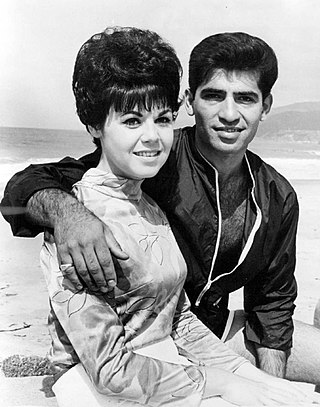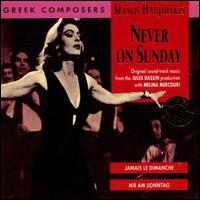Related Research Articles

Chubby Checker is an American singer and dancer. He is widely known for popularizing many dance styles, including the Twist dance style, with his 1960 hit cover of Hank Ballard & The Midnighters' R&B song "The Twist", and the pony dance style with the 1961 cover of the song "Pony Time". His biggest UK hit, "Let's Twist Again", was released one year later ; that year, he also popularized the song "Limbo Rock", originally a previous-year instrumental hit by the Champs to which he added lyrics, and its trademark Limbo dance, as well as other dance styles such as The Fly. In September 2008, "The Twist" topped Billboard's list of the most popular singles to have appeared in the Hot 100 since its debut in 1960, an honor it maintained for an August 2013 update of the list.

The twist is a dance that was inspired by rock and roll music. From 1959 to the early sixties it became a worldwide dance craze, enjoying immense popularity while drawing controversies from critics who felt it was too provocative. It inspired dances such as the Jerk, the Pony, the Watusi, the Mashed Potato, the Monkey, and the Funky Chicken, but none were as popular.
"Bristol Stomp" is a song written in 1961 by Kal Mann and Dave Appell, two executives with the Cameo-Parkway record label, for The Dovells, a doo-wop singing group from Philadelphia, Pennsylvania, who recorded it for Cameo-Parkway late that year. Appell also produced and arranged the track and his Cameo-Parkway's house band served as the studio musicians.
The Irish Showband was a dance band format popular in Ireland from the 1950s to the 1980s, with its peak in the 1960s. These bands typically featured seven to ten members, including a rhythm section, a brass section with various combinations of trumpet, saxophone, and trombone, and were fronted by lead singers, sometimes engaging in comedy skits. Their repertoire spanned rock and roll, country and western, dixieland jazz, big band tunes, Irish Céilí dances, Latin, folk, and more. Showbands were noted for their live energy, chart-topping covers, and sometimes choreographed performances. Originally touring within Ireland, successful bands later performed in Britain, the US, Canada, and on the German nightclub circuit and U.S. military bases in Europe.
Dee Dee Sharp is an American R&B singer, who began her career recording as a backing vocalist in 1961.

Linda Scott is an American pop singer and actress who was active from the late 1950s to the early 1970s. Her biggest hit was the 1961 million-selling single, "I've Told Every Little Star". She went on to place twelve songs on the charts over the next four years, the last being "Who’s Been Sleeping In My Bed," inspired by the film and written by Hal David and Burt Bacharach. In 1962, she portrayed a fictionalized version of herself in the musical film Don't Knock the Twist.
"The Twist" is an American pop song written and originally released in 1958 by Hank Ballard and the Midnighters as a B-side to "Teardrops on Your Letter". It was inspired by the twist dance craze. Ballard's version was a moderate hit, peaking at number 28 on the Billboard Hot 100 in 1960. On the US Billboard Hot R&B Sides chart, the original version of "The Twist" first peaked at number 16 in 1959 and at number six in 1960. By 1962, the record sold in excess of one million copies, becoming Ballard's fourth million seller.

"Never on Sunday", also known by its original Greek title "Ta Pediá tou Pireá", is a popular song written by Manos Hatzidakis and first sung by Melina Mercouri in the film of the same name, directed by Jules Dassin and starring Mercouri. The song won the Academy Award for Best Original Song in 1960, a first for a foreign-language picture. The film score was first released on 1 October 1960 by United Artists Records. The song has since been recorded by numerous artists, and has gained various degrees of success throughout the world. The opening of the song bears some resemblance to that of Poinciana.
Brendan Bowyer was an Irish singer best known for fronting the Royal Showband and The Big Eight, and who had five number one hits in Ireland. He was also renowned for having The Beatles open for the Royal Showband at a concert on 2 April 1962 at the Pavilion Theatre, Liverpool, England, some six months before the release of The Beatles first single "Love Me Do", in October 1962. Bowyer was regarded as one of the first headlining Elvis impersonators. Elvis Presley himself was a big fan of Bowyer's performances and would often attend Bowyer's concerts in the Stardust Resort & Casino, Las Vegas during the 1970s.
"California Sun" is a rock song first recorded by American rhythm and blues singer Joe Jones. Henry Glover is credited on the original 45 rpm single as the songwriter, although Roulette Records owner Morris Levy's name sometimes incorrectly appears on re-issues. In 1961, Roulette issued the song with "Please Don't Talk About Me When I'm Gone" as the B-side. The single reached number 89 on Billboard's Hot 100.

Don't Knock the Twist is a 1962 comedy musical film starring Lang Jeffries, directed by Oscar Rudolph and produced by Sam Katzman for release by Columbia Pictures. It is a sequel to the 1961 film Twist Around the Clock, featuring musical artists including Chubby Checker.

"Let's Twist Again" is a song written by Kal Mann and Dave Appell, and released as a single by Chubby Checker. One of the biggest hit singles of 1961, it reached No.8 on the U.S. Billboard pop chart in August of that year and subsequently reached No.2 in the UK in the spring of 1962. The song refers to the Twist dance craze and Checker's 1960 single "The Twist", a two-time U.S. No.1 single.

James Augustine "Butch" Moore was an Irish singer and a showband icon during the 1960s.

"Limbo Rock" is a popular song about limbo dancing written by Kal Mann and Billy Strange. An instrumental version was first recorded by The Champs in 1961. The first vocal version was recorded in 1962 by Chubby Checker : it peaked at number two on the Billboard Hot 100 for two weeks and at number one on the Cash Box charts. The Chubby Checker recording also made it to number three on the R&B charts. In Canada it reached number 7 for 2 weeks co-charting with the B-side.

"The Hucklebuck" is a jazz and R&B dance tune first popularized by Paul Williams and His Hucklebuckers in 1949. The composition of the tune was credited to Andy Gibson, and lyrics were later added by Roy Alfred. The song became a crossover hit and a dance craze, in many ways foreshadowing the popular success of rock and roll a few years later. It was successfully recorded by many other musicians including Lucky Millinder, Roy Milton, Tommy Dorsey, Frank Sinatra, Lionel Hampton, Louis Armstrong, Chubby Checker, Bo Diddley, Otis Redding, Quincy Jones, Canned Heat, Coast to Coast, Brendan Bowyer and Crystal Swing.
"The Stroll" is a song written by Nancy Lee and Clyde Otis and performed by The Diamonds. It reached No. 1 on the Cashbox chart, #4 on the U.S. pop chart, and #5 on the U.S. R&B chart in 1958.
"Dear Lady Twist" is a song written and produced by Frank Guida, and performed by Gary U.S. Bonds. It reached #5 on the U.S. R&B chart and #9 on the U.S. pop chart in 1962. It was featured on his 1962 album Twist Up Calypso.

For 'Teen Twisters Only is the fifth album by Chubby Checker and was released in 1961 by Parkway Records.
"Bless You for Being an Angel," also written "Bless You (For Being an Angel)" or called "Bless You," is a 1939 popular song written by Eddie Lane and Don Baker.
References
- ↑ "Chubby Checker, "The Fly" Chart Positions" . Retrieved March 1, 2019.
- ↑ "CHUM Hit Parade - November 20, 1961".
- ↑ "Chubby Checker, For 'Teen Twisters Only". Discogs . 1961. Retrieved March 1, 2019.
- ↑ "Chart Toppers", Billboard , December 25, 1961. p. 10. Retrieved March 1, 2019.
- ↑ "Brendan Bowyer with The Royal Showband Waterford, "The Fly"" . Retrieved March 1, 2019.